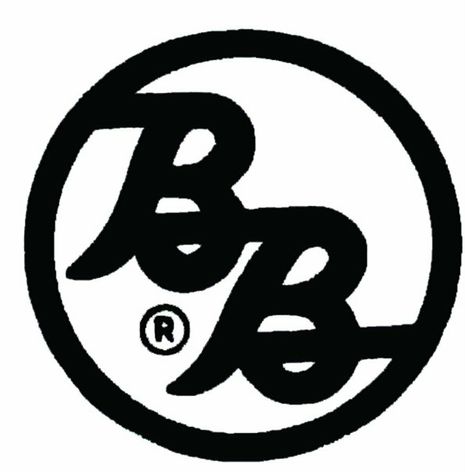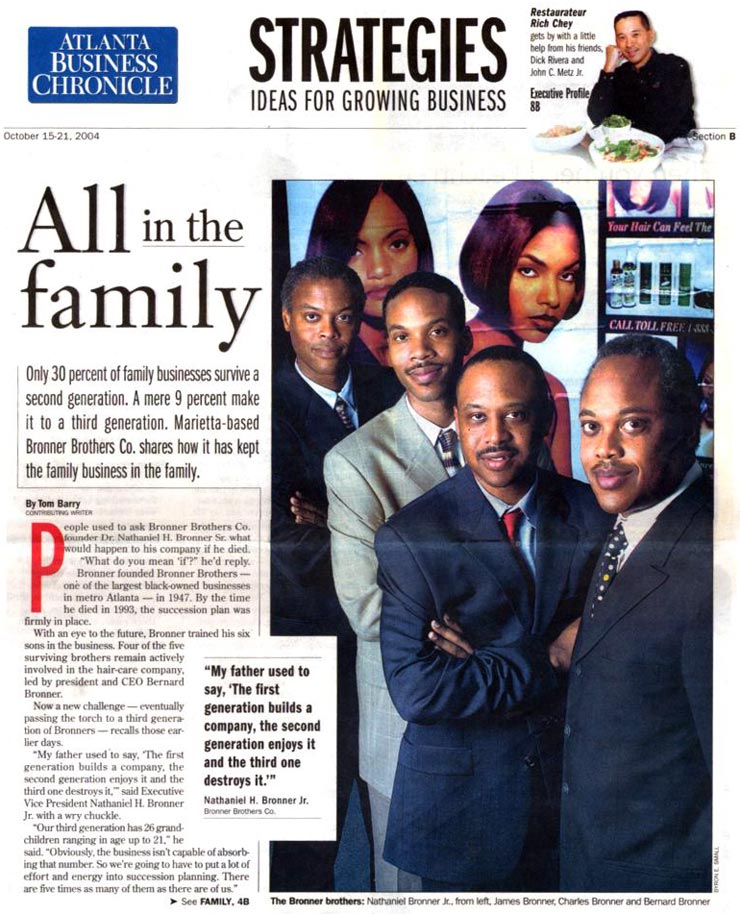
Welcome to the Weekend POU!
Today we conclude our series with a look at the Bronner Family.
The Bronner Bros. Enterprise is one of the largest private African American hair and skin care producers in the United States. Founded in 1947 by brothers Dr. Nathaniel H. Bronner, Sr. and Arthur E. Bronner, Sr., Bronner Bros. has over 300 full-time and part-time staff members. The company headquarters is located in Marietta, Georgia.
Nathaniel and Arthur Bronner, with the help of their sister, Emma Bronner, started Bronner Bros. in 1947 as a way to teach cosmetology at the local YMCA. About 300 people were in attendance at the first show. Due to the size of the show, it was later moved to the Royal Peacock Social Club and then to the Auburn Avenue Casino. In 1967, Bronner Bros. signed a contract with the new Hyatt Regency Hotel and the show was held there annually for the next 20 years. During this time, the Bronners secured a number of popular guest speakers, including Dr. Martin Luther King Jr., Jackie Robinson, Dick Gregory and Dr. Benjamin Mays.
With Nathaniel Bronner, Sr’s death in 1993, Bernard Bronner took over the company as president and CEO and the trade show has continued to grow by leaps and bounds. In 1996, all Bronner Bros. delegates traveled to Orlando, Florida for a large conference. The annual trade show is now held in the Georgia World Congress Center. The Bronner Bros. International Beauty Show is now the largest show of its kind, with more than 100,000 attendees annually from all over the world.
More and more Bronner family members are getting involved in the company. There were two brothers in the first generation of the business, six brothers in the second generation, the third generation now has 29 members.
Bernard Bronner is also a partner in Rainforest Films, which produces films targeting an urban audience and featuring African-American talent. Rainforest’s filmography includes Stomp the Yard, The Gospel, Pandora’s Box, This Christmas, and Takers.
Succession
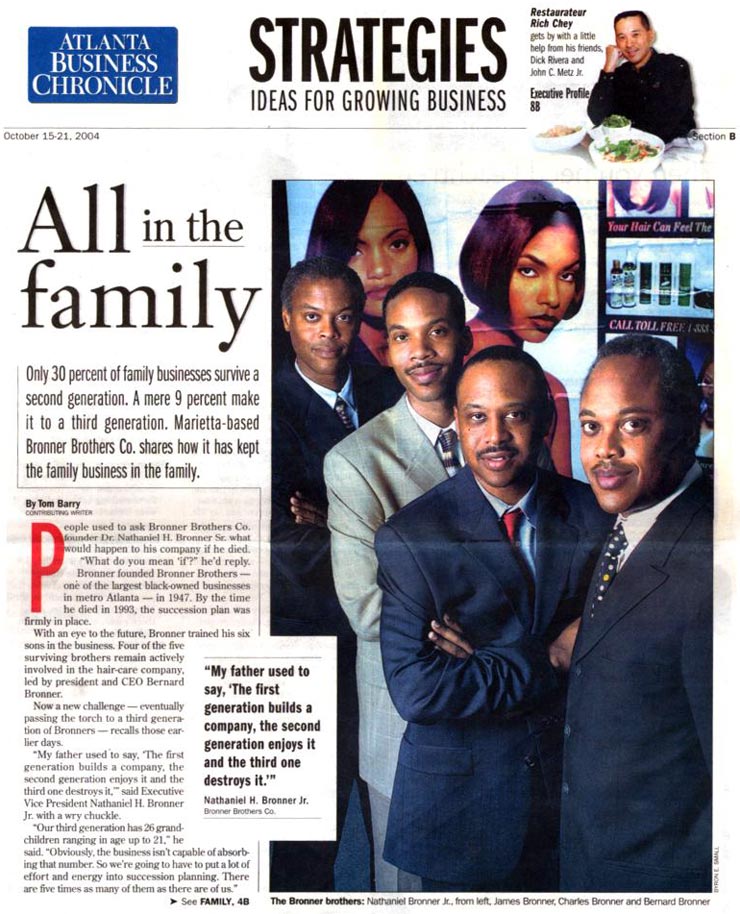
People used to ask Bronner Brothers Co. founder Dr. Nathaniel H. Bronner Sr. what would happen to his company if he died. “What do you mean ‘if’?” he’d reply. Bronner founded Bronner Brothers — one of the largest black-owned businesses in metro Atlanta — in 1947. By the time he died in 1993, the succession plan was firmly in place.
With an eye to the future, Bronner trained his six sons in the business. Four of the five surviving brothers remain actively involved in the hair-care company, led by president and CEO Bernard Bronner.
Now a new challenge — eventually passing the torch to a third generation of Bronners — recalls those earlier days.
“My father used to say, ‘The first generation builds a company, the second generation enjoys it and the third one destroys it,'” said Executive Vice President Nathaniel H. Bronner Jr. with a wry chuckle.
“Our third generation has 26 grandchildren ranging in age up to 21,” he said. “Obviously, the business isn’t capable of absorbing that number. So we’re going to have to put a lot of effort and energy into succession planning. There are five times as many of them as they were of us.”
Bernard — as well as Nathaniel — has no doubts they’ll succeed.
“I believe we’ll be around for at least the next 100 years,” he said. “We’re continuing the same principles we learned from my father. Same principles, same result.”
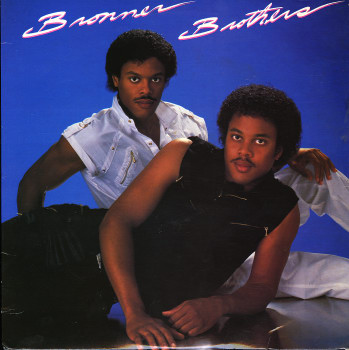 (tell me y’all remember this album cover. Yes they did, released in 1983!)
(tell me y’all remember this album cover. Yes they did, released in 1983!)
While daunting for any organization, succession planning can be a veritable nightmare for a family-owned company, where friction among relatives can vastly complicate the inevitable business challenges. Which explains why relatively few family-owned enterprises make it to a second generation, much less a third.
“It’s simple mathematics,” said Joseph Astrachan, director of the Cox Family Enterprise Center at Kennesaw State University. Astrachan has researched some 15,000 family-owned businesses over two decades. “Only 30 percent of family businesses make it from one generation to the next.”
The upshot? A mere 9 percent of such entities survive to the third generation and a trifling 3 percent to the fourth.
“All kinds of problems can intrude, from large egos to lack of self-esteem to historical issues that haven’t been worked out,” he said. “The relatives, for instance, may not trust one another.”
Astrachan said it’s never too early for family-owned businesses to begin succession planning.
“The earlier they begin, the smoother the process,” he said. “But most of them start planning only about five years before the leader plans to retire, which is usually too long to wait.”
Prompted by a heart attack he suffered in 1962, Nathaniel Bronner Sr. didn’t wait. He took pains to teach his six sons about the company, which today has over 100 full-time employees and generates $25 million in annual revenue. In the last five years of his life, his sons ran the majority of the operation.
Bonner Brothers is known for its massive beauty products tradeshows, which attract up to 60,000 people to the Georgia World Congress Center. WalMart is the company’s No. 1 customer.
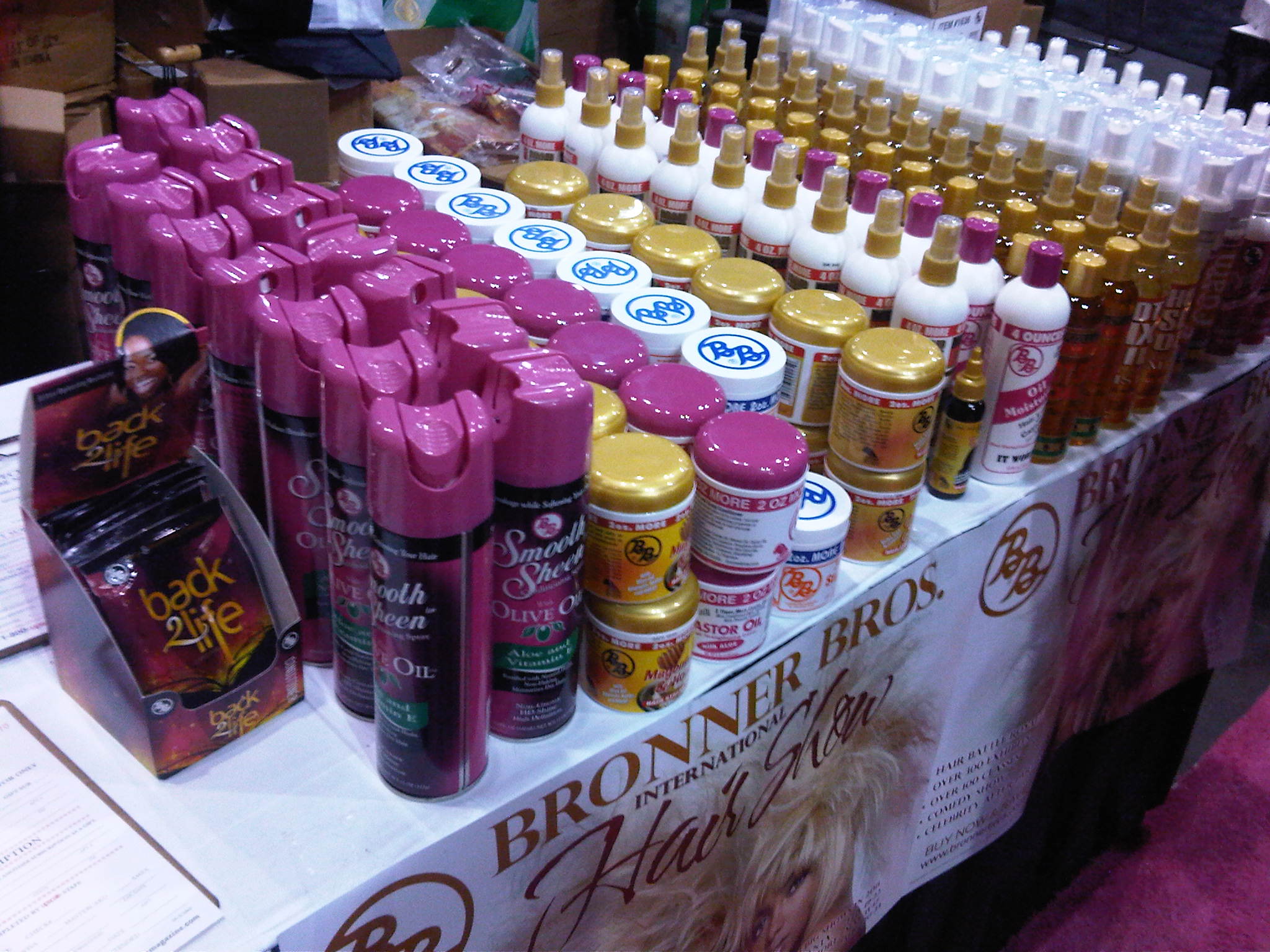
One potential succession problem was averted when Nathaniel, the oldest son, who had launched the company’s manufacturing operation, told his father that the top post should pass to younger brother Bernard.
“I knew the presidency was not my destiny,” Nathaniel Jr. said. “I told my father and Bernard that very early on.”
Still, succession “hasn’t been a breeze for us,” Nathaniel said. “It’s taken every bit of training we’ve had to keep Bronner Brothers alive and prosperous. Business is tough no matter what. One challenge is that we all have side interests, and sometimes they pull both focus and resources away from the main company. Managing everything is a challenge.”
Bernard, for instance, owns Upscale magazine while Nathaniel and James own Century Systems, a health products company.
Like father, like sons. The Bronners are preparing for succession, even though Bernard is only 43, five years younger than Nathaniel Jr. Charles, 36, heads accounting while James, 30, is information technology manager. Cousins and other relatives comprise another 10 employees.
The only brother not actively involved is Bishop Dale Bronner, who heads the 9,000-member World of Faith Family Worship Cathedral in Austell. (Nathaniel Jr., Charles and James also are ministers.)
So far, half of the grandchildren have worked summers for the Marietta-based company, which operates two manufacturing facilities, a shipping operation, two beauty stores, a hair weaving studio and a public relations office besides the corporate headquarters.
Nathaniel’s 8-year-old son, Nathaniel III, worked this past summer in the shipping department.
“If the kids are big enough to stand, they can work,” his father said. “It’s mainly a learning experience, so the business won’t be foreign to them later on. Basically, they should be educated on the company by the time they go off to college.”
Nathaniel Jr. said his father placed a premium on hard work and deportment, not grades earned in school.
“He had seen so much of life, including a lot of educated fools,” Nathaniel said. “Even in college he was a businessman. He used to loan money to his professors. My father was a wise man who knew that education was a good thing but not the only thing.”
Life was tough growing up, Nathaniel said. “We all had paper routes starting at 4 in the morning. The younger generation is more privileged than we were. It won’t acquire the hard-won wisdom that derives from that kind of work and discipline.”
All the Bronner brothers graduated from college, and the expectation is that their children will as well. The kids also will be encouraged to work outside the family business to acquire other perspectives.
“I think that’s a good idea,” said Nathaniel, the first black chemistry graduate from Eckerd College in St. Petersburg, Fla. “When I was in college, I had a route servicing beauty salons in four cities. Some of my brothers had college internships with other companies, though none have had full-time jobs outside of Bonner Brothers.”
Nathaniel is optimistic that a new leader will eventually emerge from the thicket of possibilities.
“If we put the right structure in place — and provide sufficient resources — it will fortify even a mediocre leader,” he said.
After all, the company has a potent weapon familiar to other family enterprises. “At Bronner Brothers, we have a strong sense of legacy,” he said.
Here is a video from the 2007 International Hair show: Hair Battle

